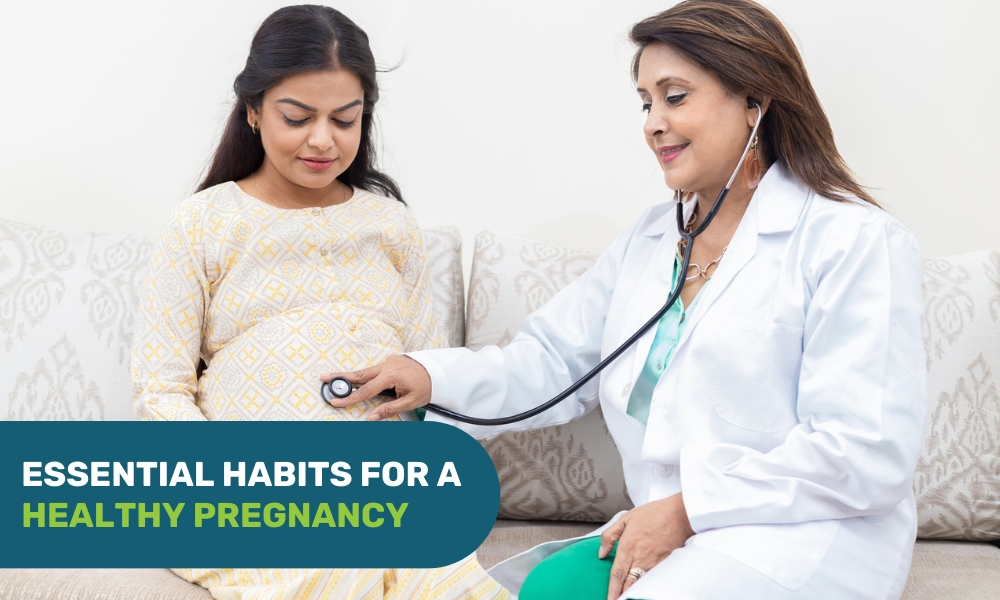Pregnancy is an exciting time for a woman but can also be stressful. It is a phase that brings about hormonal and physical changes impacting a woman’s physically and mentally health. Women need to be extra cautious about their health during their pregnancy.
Here is a list of habits that can help in having a healthy pregnancy.
-
Increase your Nutrition: Good nutrition during pregnancy is crucial for the baby’s growth and development and the mother’s overall health. Although nausea and vomiting during the first few months are at peak for a few mothers, one must try to eat a well-balanced diet full of vegetables, fruits, and whole grains and take prenatal vitamins. Folic acid should not be missed as it prevents major birth defects. Here are a few points to remember about eating during pregnancy:
-
Avoid unpasteurized milk and products made from it, like soft cheese.
-
Ensure the meat is cooked well; avoid eating raw meat.
-
Avoid smoked and uncooked seafood.
-
Wash all fruits and vegetables well before eating.
-
Do not miss on drinking fluids: As the baby grows within the womb, it requires fluids. Further, fluids also reduce constipation, flush out toxins and waste, help prevent bladder infections, and limit swelling. Hence, drinking a minimum of 8-10 glasses of water is crucial.
-
Strict No to Alcohol & Smoking: Consuming alcohol or smoking is not safe during pregnancy. While an expecting mother consumes alcohol, it passes to the baby through the placenta, and the unborn is not able to process the alcohol in the same way the mother does. Hence, consuming alcohol, especially during the first trimester, can be fatal. Both alcohol and smoking may affect foetal development and increase the risk of birth defects.
-
Do not miss your prenatal care check-ups: Meeting one’s gynaecologist as per schedule is crucial during pregnancy. One may delay other commitments, but seeing the doctor regularly is important, as every appointment can help the doctor and the mother understand the baby’s growth and eliminate threats, if any. Further, certain vaccinations during pregnancy are essential. One must not miss the same.
-
Manage pre-existing medical conditions: During the early period of pregnancy, the developing baby, placenta, and other physiological changes produce and release increasing quantities of hormones and other substances into the maternal circulation. These trigger events transforming the mother’s heart, lungs, and kidneys. Therefore, taking care of pre-existing health issues, if any, is vital.
-
Managing Stress: Pregnancy brings a range of emotions, and not all are positive. Some women can feel anxious or depressed during pregnancy. If one feels stressed or unwell, talk to a doctor about emotional wellness during pregnancy. Indulging in relaxing activities may also help. Stress should be managed as it can affect the baby’s growth.
-
Getting sufficient rest: During pregnancy, a woman’s body needs to produce more blood, and therefore, the heart needs to work extra to circulate blood to the mother as well as to the baby in the womb. For all these extra efforts, the body requires rest. An expecting mother must ensure to have an undisturbed sleep of 7 to 9 hours.
-
Travelling Safe: Travelling for expecting mothers can be a tricky proposition. If there are no identified concerns or complications with pregnancy, it is generally safe to travel. The ideal time to travel during pregnancy is the second trimester. While travelling, maternity reports and prescriptions must be kept handy.
-
Tracking Weight Gain: A woman generally gains weight during pregnancy. However, excessive weight gain during pregnancy can be dangerous for both the mother and the child. Therefore, tracking weight gain throughout the pregnancy can help avoid obesity.
-
Staying active: Exercising during pregnancy has several benefits. It improves heart health, increases energy levels, helps to stay fit, reduces stiffness and back and neck pain, and prepares the body for labor.
-
Understanding Genetics: In order to prevent birth defects, it is vital to know genetic factors and genetic disorders. This helps in taking required action to avoid developmental disabilities and other unique conditions in children. In case of a family history of a genetic condition or history of several miscarriages or infant deaths, one must consult a genetic counsellor.
Pregnancy is a very delicate phase, and being cautious about everything is the only way to be safe and sound during this phase. In addition to the above points, one must avoid the following:
-
Avoid climbing on ladders or standing on anything high or wobbly.
-
Always wear a seat belt while travelling in a four-wheeler or a plane.
-
Avoid things that can make the body too hot, as it may be harmful to the baby, such as a hot tub or sauna.
In a nutshell, a few months of caution can help build good health for the mother and the baby!





